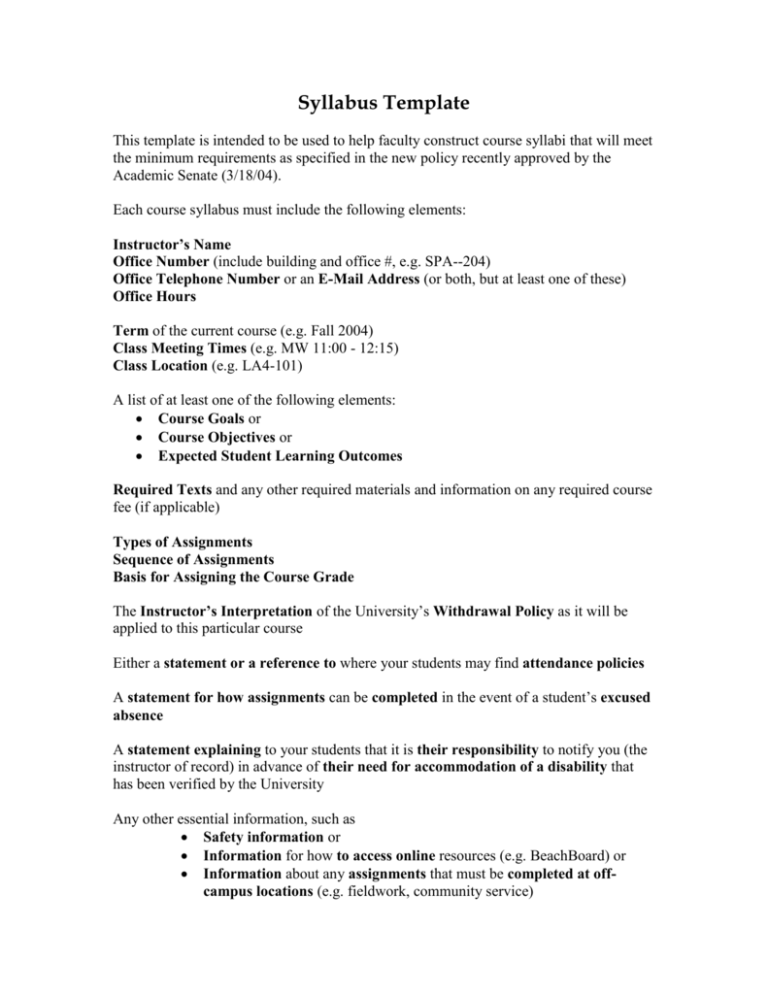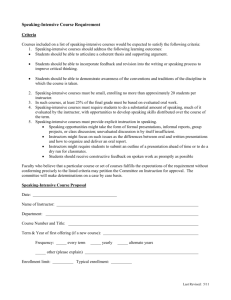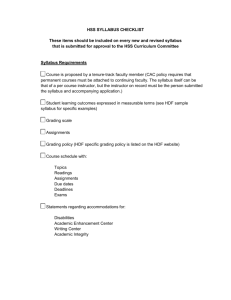Syllabus Template
advertisement

Syllabus Template This template is intended to be used to help faculty construct course syllabi that will meet the minimum requirements as specified in the new policy recently approved by the Academic Senate (3/18/04). Each course syllabus must include the following elements: Instructor’s Name Office Number (include building and office #, e.g. SPA--204) Office Telephone Number or an E-Mail Address (or both, but at least one of these) Office Hours Term of the current course (e.g. Fall 2004) Class Meeting Times (e.g. MW 11:00 - 12:15) Class Location (e.g. LA4-101) A list of at least one of the following elements: Course Goals or Course Objectives or Expected Student Learning Outcomes Required Texts and any other required materials and information on any required course fee (if applicable) Types of Assignments Sequence of Assignments Basis for Assigning the Course Grade The Instructor’s Interpretation of the University’s Withdrawal Policy as it will be applied to this particular course Either a statement or a reference to where your students may find attendance policies A statement for how assignments can be completed in the event of a student’s excused absence A statement explaining to your students that it is their responsibility to notify you (the instructor of record) in advance of their need for accommodation of a disability that has been verified by the University Any other essential information, such as Safety information or Information for how to access online resources (e.g. BeachBoard) or Information about any assignments that must be completed at offcampus locations (e.g. fieldwork, community service) Note: If there is any information in your syllabus that is subject to change, you should note that in the appropriate place(s). While not required in your syllabus, it can be helpful to provide students a reference to the “General Regulations and Procedures” in the University Catalog. It is also advisable for instructors to discuss with their students how they will interpret these “Regulations and Procedures.” It is highly recommended that instructors carefully explain and discuss with their students how the policy on cheating and plagiarism will be interpreted. If you are teaching either a hybrid, local online, or distance education course, you must include several additional elements in your course syllabus. An explanation of (1) how the instructor will communicate with the students and how the students will communicate with each other; (2) how online participation will be assessed and graded; (3) how the instructor will monitor the online activities of the students; (4) how the standards of appropriate online behavior will be maintained; (5) the level of technical competence required of the students; (6) what the minimum computer hardware and software requirements are for the class, and what department, college, or University facilities are available to support these requirements for students who cannot afford to buy the technology; (7) the alternative procedures for submitting work in the event of technical breakdowns; (8) the on-campus meeting requirements, if any; (9) how academic honesty will be enforced. Faculty members must submit copies of the syllabus for each course to the department office. Departments and programs will keep a copy of each syllabus for at least five years. The department will submit copies of all course syllabi to the University Library in a format specified by the Library by the census date of the term.











